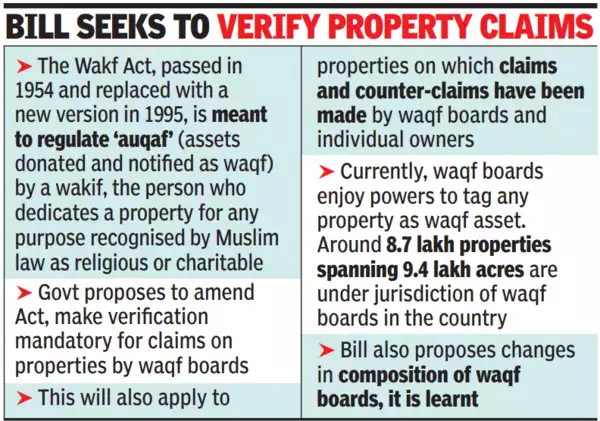Proposed amendments to 'The Waqf (Amendment) Bill, 2024

To ensure that the Waqf Board reflects the secular fabric of society, it's important to address its structural and functional imbalances, which currently align predominantly with one religious community. While secularism is often proclaimed at the highest levels, the existing framework of the Waqf Board can be seen as incongruent with these ideals. Here are combined suggestions to make the Waqf Board more inclusive, transparent, and reflective of a truly secular ethos:
1. Inclusivity in Governance and Representation
- Diverse Representation: Amend the composition of the Waqf Board to include representatives from various communities and backgrounds. This doesn’t dilute the primary Islamic focus but ensures that diverse voices contribute to decisions, bringing transparency and fairness.
- Independent Oversight: Introduce non-Muslim, independent experts in financial, legal, and administrative roles to oversee the functioning of the Waqf Board, ensuring decisions are made with accountability to all sections of society.
2. Abolish Unilateral Property Claims
- End Arbitrary Powers: Remove the board's ability to unilaterally claim any property as Waqf. This unfairly shifts the burden of proof onto property owners, who must fight the claim in the Waqf's internal tribunals. The resolution of such disputes should be moved to independent civil courts, ensuring impartial and just handling of cases.
- Burden of Proof: Place the burden of proof on the Waqf Board when claiming any property. The board must provide sufficient and transparent evidence in a court of law, ensuring that property owners’ rights are respected and protected.
3. Secular Focus on Public Welfare
- Universal Application of Resources: Broaden the scope of Waqf properties to include public welfare projects that benefit people of all religions. While maintaining the religious sanctity of Waqf properties, a portion of the resources can be allocated for broader social causes, such as education, healthcare, and poverty alleviation, that benefit society at large.
- Transparency in Beneficiary Selection: Ensure that the Waqf Board prioritizes helping the most marginalized sections of society, regardless of their religion. By ensuring a fair and transparent system for selecting beneficiaries, the board can reflect secular ideals in action.
4. Transparency and Accountability
- Public Access to Records: All Waqf property records, financial statements, and board decisions should be publicly accessible, fostering transparency. Making such information available to the public, regardless of religion, ensures the board operates in a manner consistent with the secular principles of transparency and public accountability.
- Regular Audits: Mandatory third-party audits should be introduced, with reports made publicly available to ensure the correct utilization of resources. This enhances trust and prevents any misuse or mismanagement of funds.
5. Broaden the Definition of "Public Purpose"
- Inclusive Public Service: Amend the Waqf Act to redefine "public purpose" to include a broader range of social services, benefiting all communities. This allows Waqf properties to be used for developmental projects in secular education, healthcare, and welfare, reflecting the secular fabric of Indian society.
- Collaborative Initiatives: Encourage collaboration between the Waqf Board and non-Muslim charitable organizations for projects that have a broad societal impact. This would foster interfaith cooperation and demonstrate the board’s commitment to secularism.
6. Democratic Elections for Key Roles
- Merit-based Appointments: Ensure that the appointments of board members are merit-based and democratic, preventing the board from becoming a political tool or religious stronghold. Independent and secular oversight in the election process could help break any monopolistic control.
- Term Limits and Accountability: Limit the tenure of board members and introduce regular performance evaluations to keep the board dynamic and accountable to the community at large.
7. Fair and Secular Dispute Resolution
- Independent Judiciary for Disputes: Establish a neutral, secular dispute resolution mechanism outside the Waqf tribunal system, which may carry biases. Disputes related to Waqf property should be handled by independent civil courts, ensuring a fair legal process.
- Interfaith Committee: Introduce an interfaith dispute resolution committee with members from various communities to mediate disputes and resolve conflicts fairly. This reinforces the board’s commitment to secularism and fairness.
8. Public Awareness and Education
- Secular Education Initiatives: Ensure that Waqf-funded institutions emphasize secular education, creating spaces where students from all religions can engage in learning together. This promotes harmony and reflects the inclusive, secular vision of society.
- Awareness Campaigns: Increase public awareness of how Waqf properties can benefit all communities, not just a particular religious group. This helps ensure that people understand the board’s broader social welfare goals and encourages interfaith participation.
9. Independent Management and Conflict of Interest Prevention
- Prevent Political Influence: Amend the law to prevent any political interference in the functioning of the Waqf Board. Board members must not have any personal or political conflicts of interest, ensuring decisions are made solely in the public's best interest.
- Secular Collaboration: Encourage collaboration with secular institutions and NGOs to ensure that the benefits of Waqf properties reach all sections of society. This prevents insularity and promotes a more inclusive management approach.
Conclusion: Uphold Secularism in Action
While the Waqf Board currently serves an important function for the Muslim community, reforms are necessary to align it with the secular principles India upholds. By broadening its scope to benefit all communities, ensuring transparent governance, and eliminating the potential for arbitrary actions, the board can demonstrate its commitment to secular values in both word and action. This would reflect true fairness, breaking down perceptions of favoritism and religious exclusivity, and promote unity in a diverse society.
Failing to reflect secularism within its own operations can appear hypocritical, leading to public distrust. Therefore, these changes are crucial not only for the integrity of the Waqf Board but also to uphold the secular promises made to the people of India.
Please find the the proposed amendments to 'The Waqf (Amendment) Bill, 2024’, available on the Lok Sabha website:
English: https://sansad.in/ls/legislation/bills
Hindi: https://sansad.in/ls/hi/legislation/bills
You too can send your suggestions to: jpcwaqf-iss@sansad.nic.in
Last day to submit your suggestions is 13th September 2024.
- Waqf_Board_reforms
- inclusivity
- secularism
- transparency
- property_claims
- religious_endowments
- diverse_representation
- accountability
- public_welfare
- secular_governance
- independent_judiciary
- merit-based_appointments
- fair_dispute_resolution
- public_awareness
- transparency_in_governance
- interfaith_collaboration
- democratic_elections
- transparency_in_audits
- secular_education_initiatives
- conflict_of_interest_prevention
- independent_oversight
- humanitarian_focus
- social_welfare_projects
- collaborative_initiatives
- Political Leaders
- Art & Crafts
- Dance & Music
- Sanatan Dharma
- Education & Training
- Food & Drinks
- Gaming
- Health & Fitness
- Home & Gardening
- Literature & Culture
- Love
- Medicine & Ayurveda
- Motors & Vehicles
- Movies & Cinema
- Parenting
- Politics
- Science & Technology
- Shopping
- Social Media
- Spirituality
- Sports
- War & History
- Yoga & Meditation
- Travel & Tourism
- Natural Disaster
- Business & Startups
- DIY & Home Decor
- Finance
- Personal
- News
- Pet Lovers
- Wild Life & Nature
- Podcast & Audio Books
- Poetry
- Law & Order
- Moral Stories
- Jokes & Humour
- Other

